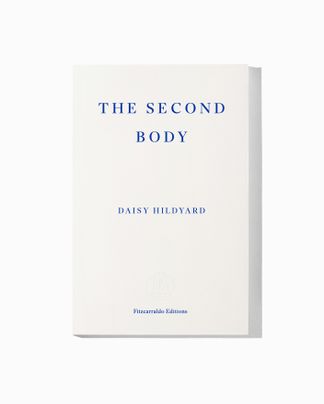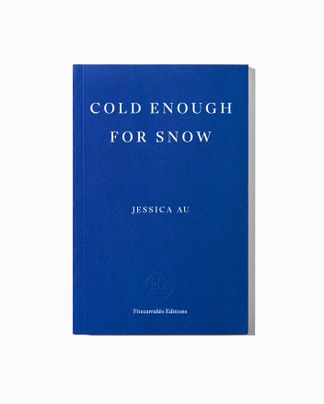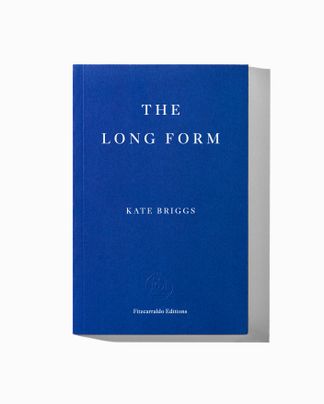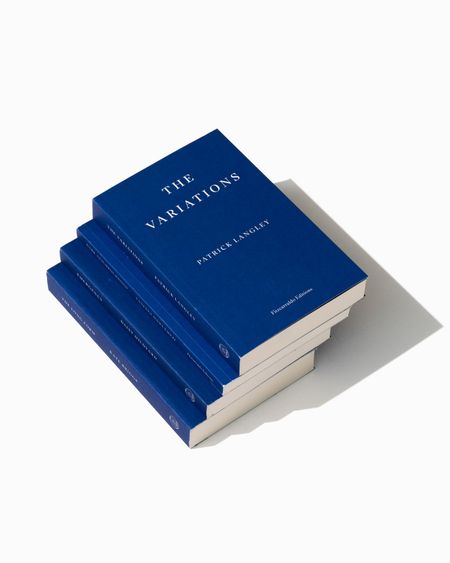Emergency is a novel about the dissolving boundaries between all life on earth. Stuck at home alone under lockdown, a woman recounts her 1990s childhood in rural Yorkshire. She watches a kestrel hunting, helps a farmer with a renegade bull, and plays out with her best friend, Clare. Around her in the village her neighbours are arguing, keeping secrets, caring for one another, trying to hold down jobs. In the woods and quarry there are foxcubs fighting, plants competing for space, ageing machines, and a three-legged deer who likes cake. These local phenomena interconnect and spread out from China to Nicaragua as pesticides circulate, money flows around the planet, and bodies feel the force of distant power. A story of remote violence and a work of praise for a persistently lively world, brilliantly written, surprising, evocative and unsettling, Daisy Hildyard’s Emergency reinvents the pastoral novel for the climate change era.
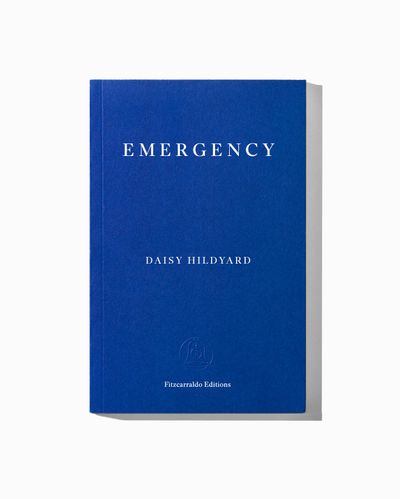
Emergency
Published 20 April 2022 | French paperback with flaps, 224 pages
Winner of the 2023 RSL Encore Award
Emergency
One spring evening, when I was old enough to be outside and alone, I was sitting above the quarry on the edge of the village when I saw a panel of clay drop away from the facing vertical side and fall into a pool of water. Behind it the interior of an animal’s burrow was revealed in relief, like a bombed house with one wall removed. Inside, instead of wallpaper or dangling wires, there was one globe-shaped hollow lined with fluff and leaf mould, and passages leading from it which all ran through the roots of the turf, with one exception: the long tunnel which dropped down into the earth, then turned at an angle, in a stretched V-shape, and began to rise again. Within the passage, heading upwards, there was a small animal – brown and furry, whether it was mouse, a shrew, or a vole, I couldn’t see.
Parallel to this creature, high above the pool of water on the quarry bed, there was a female kestrel, floating. The two creatures were at eye level with one another. The kestrel tilted and allowed herself to rise, just a little faster than the animal. Then the animal disappeared from my view, coming up through the ground; meanwhile the kestrel continued to ascend towards the clouds until, abruptly, she stopped. She stopped absolutely – as though somebody had pressed pause. Only the way her position varied very slightly, tilting one way and then another, showed that she was holding herself against a current.
Holding my gaze on her I rose slowly and as smoothly as I could, and skirted along the track that ran around the quarry at the top, taking care to make no sudden movement and to give the bird a wide berth so that she didn’t flit. She must have been able to see me. She didn’t move.
From the track I could see the animal again – a large vole, male, hiding under a clump of dead turf that overhung the track. He wasn’t in the kestrel’s eyeline. We all waited to find out who would move first. There was a clear bronze early evening light and a cold breeze. The grasses flickered. Then the vole made a sudden break, dashing into the open and stopping in the middle of the wheel-rut, right where he was most exposed. There was an island of grass in the middle of the track, and taller grasses across the field all around – this was the only area that was bald and open, and the only place the vole could look so dark and substantial against the beige dust. I stood at the edge of the track like a tree. He was almost at my feet.
The kestrel allowed her equilibrium to be disturbed. She tipped her body, carved a line in the air, and came to hover directly above the vole. Low sunlight projected her shadow away from her so that it fell beyond his horizon. Still the vole remained in the same place. I could see him intimately now – his features were precise and miniature: acorn-cup ears, thread-fine whiskers radiating in all directions, and tiny hand-shaped feet. His whole body was vibrating violently. He seemed unable to move. The kestrel had paused again and my gaze moved up and down, drawing a direct line between them, like a lift between two floors of a building. I felt a sense of love arise inside me, as huge and widespread as the vole was small and specific, and it occurred to me that I could rescue him.
I knew what this would mean because I’d done it before. When the huge black rabbit who lived in a run in our garden had a nest full of babies, my parents had told me not to touch them. I sat outside the hutch and waited for them to be revealed when their mother rolled aside – tiny pink squirming things which were in the process of becoming, from day to day, delicate versions of their parents. When they were a week or so old, skin still visible through a sheen of black fur, my mother explained why I wasn’t to touch them: the rabbit would eat her babies if they had a strange smell on them. I held my hands in front of my face but they didn’t smell like anything except, faintly, soap. My mother left and I stayed watching the rabbits for a while. Then I put one in my pocket, closed the lid of the hutch at the end of the run, and ran down the drive, along the street, and into Clare’s garden. Clare wasn’t there, but Nic was sitting on the back step with a mug of tea and a biscuit, one cigarette waiting beside her on the warm brick. She was always there, waiting like that when Clare came home from school. I closed the gate and approached, warily, up the path, until I was in front of her, waiting for a sign that she had recognized me, but she wasn’t much interested in my presence – she was still looking over my shoulder. I glanced behind me but there was nothing there, only the sun setting over the fields and the quarry. There was a small yellowish scar below the outer edge of one of her eyes which very slightly affected its shape, so there was always something unusual about her face, but in that moment she was looking towards the sun and her brown iris seemed to have been set on fire, melting diamonds of golds and oranges wheeling around the rim, which gave her a blind, illuminated fierceness, and I felt afraid of her. Then it passed and I said ‘Hi is Clare playing.’
Nic didn’t say hello or speak in the indulgent but dishonest tone that adults usually used when speaking to me at that time in my life. Distractedly, still looking with disturbing directness into the sun, she told me that Clare wasn’t yet home because she had gone to her grandmother’s house after school. Adam was inside, watching a cartoon, if I wanted to wait.
(…)
‘Hildyard doesn’t offer the narratives of therapy, social criticism or self-development to be found in other English pastoralists (Helen Macdonald, Ronald Blythe or Adrian Bell). Her style is more reminiscent of such contemporary poets as Kathleen Jamie and Alice Oswald, with their quiet and attentive watchfulness to a non-human reality they only half-understand. Her prose calls for, and frequently earns, the same respectful attentiveness from its readers.’
— Dr Nikhil Krishnan, Telegraph
‘This book succeeds because of the chilly and beautifully sustained voice of its narrator, the precise embroidery of its sentences and paragraphs, its observations of the natural world and insistence that there is no distinction between humans and environments.’
— Sarah Moss, Guardian
‘In the wake of the biggest natural melodrama of recent times, Emergency is a thoughtful, poised reflection on how much change we humans, among the animals, can ever bring to bear.’
— Natalie Whittle, Financial Times
‘Past and present, nature and humanity, life and death intermix, ebbing and flowing in a stream of prose that carries the reader on an exhilarating and frequently provocative and violent ride.’
— Philippa Nutall, New Statesman
‘Daisy Hildyard’s Emergency is a pastoral novel for the age of dissolving boundaries.… The slowness and gentleness of the text, its pace and its language, make you consider its title. There are emergencies and ruptures, but less of the urgent kind. More at play is a slow, steady and inevitable unfolding – of emergence.’
— Abi Andrews, Irish Times
‘Breaking apart well-worn tropes, Emergency provides an unaffectedly complicated picture of our shared environment, exposing the gaps in the lockdown narrative that ”nature is healing”. Airborne pesticides continue to circulate; a ring pull found by the narrator as a child washes up decades later in a seabird’s corpse. A common fragility unites all species in this quietly magnificent novel.’
— Damian Walsh, Literary Review
‘In refusing to privilege human drama over natural processes, Hildyard captures the ecosystem’s delicate interconnectedness and suggests a new way of writing about our toll on the environment.’
— New Yorker
‘Hildyard’s feat has been to create a novel that presents itself not as a story but as a complex ecosystem…. The beauty of Emergency is in its attempt to glimpse an expanded paradigm of meaning, which encompasses but isn’t limited to our own.’
— The Wall Street Journal
‘A stunning book – a balm for our times – containing the incredible gift of the everyday.’
— Kirkus
‘Daisy Hildyard has confronted our new nature and, bravely, compellingly, makes our shared emergency visible.’
— Claire Pettitt, TLS
‘It’s a gorgeous novel of a youth spent on the cusp of societal upheaval.’
— Publisher’s Weekly
‘The writing in Emergency is slow and meditative. Still, the narrator’s lips are taut against ready-to-bare teeth – she has an unwavering commitment to expanding the realities of life on earth and the complicated relationship between man and nature.’
— Anna Cafolla, The Face
‘Emergency is a strange and luminously original novel. Daisy Hildyard writes about childhood with a kind of ecstatic detachment, dissolving the boundaries between past and present, and between human and animal life. I find her work exhilarating and subtly provocative. There is, as far as I’m aware, nothing else quite like it in contemporary English-language fiction.’
— Mark O’Connell, author of Notes from an Apocalypse
‘Rich and unflinching, this writing expands our sense of what it means to live, as we do, in a time of crisis. It leads us beyond rational climate debates into the deeply sensual, and sometimes nightmarish, places where our inner and outer worlds make contact.’
— Katharine Kilalea, author of OK, Mr Field
‘In this powerfully attuned novel, the world presses in on all sides, refusing to become background. From the discarded plastics of the narrator’s childhood, now circulating microscopically in the world around her as an adult, to the journey of grass through the bodies of animals and back out to the field as fertiliser, Emergency shows us the cost, as well as the conflicted splendour, of a world that is “fatally interconnected”. Its prose is bewitching and uncompromising, alive to the enmeshing of cruelty with care that articulates our shared – human and nonhuman – existence.’
— Daisy Lafarge, author of Paul
‘Emergency is an incisive kaleidoscope of past and present, nature and industry, stillness and pace, collapsing all into a tapestry of consciousness.’
— Aysegül Savas, author of Walking on the Ceiling
‘Hildyard’s writing stretches the mind.’
— Alexandra Kleeman, author of Something New Under the Sun
‘Emergency is a book to be relished, its precise, subtle prose devoid of romanticism yet passionate in its own way. Hildyard’s writing is a feast for the senses: vivid and beguiling, pragmatic and unflinching, and deeply thoughtful.’
— Rachel Farmer, Lunate
Daisy Hildyard’s first novel, Hunters in the Snow, received the Somerset Maugham Award and a ‘5 under 35’ honorarium at the USA National Book Awards. Her essay The Second Body, a brilliantly lucid account of the dissolving boundaries between all life on earth, was published by Fitzcarraldo Editions in 2017. Her novel Emergency won the RSL Encore Award in 2023. She lives with her family in North Yorkshire, where she was born.

